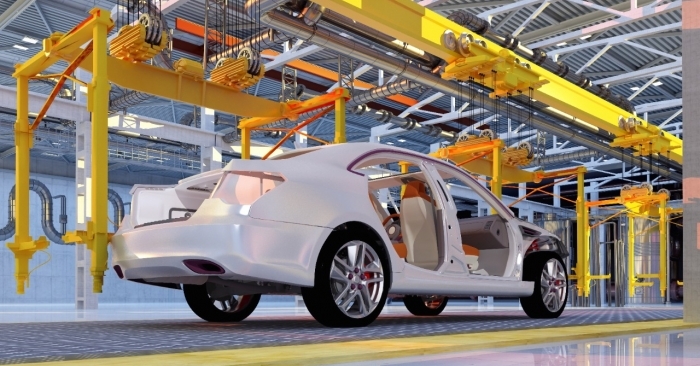‘Supply chains of the future will be digitally enabled, data-centric’- industry experts
Leading industry domain experts concurred that supply chains of the future are going to be highly digitally enabled and that data is going to become central to any supply chain design. As India looks to the 5G wave and the entry of connected, autonomous vehicles, the data they bring could also help their supply chains garner more visibility, enhan

December 12, 2021: “Without big data, you are blind and deaf and are in the middle of a freeway,” said leading American theorist and management consultant Geoffrey Moore about the rising importance of data science in today’s hyper-digital world.
Many top industry leaders from the automotive logistics industry deliberated on this and on the topic of ‘Building a data-centric supply chain for the world of autonomous and connected vehicles at the fifth edition of ITLN’s ‘Auto SCM Virtual Summit’ presented by Frankfurt Airport and World Trade Center Pune- India which took place on Thursday.
Industry leaders discussed the implications of how when faced with data complexity, shortages, constant disruptions, lack of communication and lack of visibility post the pandemic many made the shift to predictive analytics, IoT, telematics, newer IT solutions, newer technologies and automation and how these were changing and disrupting the supply chain network.
Ruby Abidi, Director Air Cargo, India Subcontinent, Cargo-partner said, “The automotive industry is shifting gears and is going through this orbit shifting transformation of getting these autonomous, controlled vehicles. Digitalisation and automation is an absolutely astounding requirement and there is a great future ahead for this. Digitalisation means using the next generation technologies like AI, Robotic process automation, robotic warehouses, machine learning, last mile delivery and sensors everywhere. Another important aspect is that we need an organisational level culture change and that innovative mindset to drive all of this. The positive side of the pandemic was that we saw an accelerated movement towards digitisation.”

Ruby Abidi, director air cargo, India Subcontinent, Cargo-partner
Huned Gandhi, Managing Director ASL Indian Sub-continent, DACHSER said, “ The automotive industry is talking about ADAS(Advanced Driver Assistance Systems) in a big way now and we will soon see more features in our cars. I am sure that autonomous and connected cars are not far away even for India and this will change the face of the automotive industry. Digitalisation is even more important in the current situation. Today the reliability of the supply chain is under a big question. There are frequent delays and even the big shipping lines and airlines are not able to maintain the transit times for several reasons that are also beyond their control. This where data, digitalisation and technologies are going to play a major role. We have to depend on new technologies, IT systems and telematics. I think the automotive industry is already going through telematics and I think the supply chain industry needs to be geared on the IT side to provide the solutions to the customers.”

Huned Gandhi, managing director ASL Indian Sub-continent, DACHSER
Prashanth Murali Kaivar, AVP and Global Practice Head, TechMahindra said, “I think visibility, agility and reliability are key driving forces for the supply chains of the future. One important part is the enablement coming from telecommunication, the 5G network and the RAN(Radio Access Network) networks, which are increasing at 45% CAGR YoY. The 5G network is going to greatly impact the visibility and the ‘track and trace’ of devices through the supply chain and of assets that build capacities in the supply chain. So this where your whole inventory management across the supply chain in terms of being able to move it fast, where required, when required, bringing in agility, bringing the visibility as to what action needs to be taken and also generating next best action becomes critical.”

Prashanth Murali Kaivar, AVP and global practice head, TechMahindra
Speaking about data in conjunction with connected, electrical and autonomous vehicles Mandar Kothawade, Supply Chain Head, Valeo India said, “From the autonomous vehicle point of view, based on the customer demand we have already started to build up the data collection from the forecast point of view. We are working to offer 24 months of forecast. In the inhouse production, we have already started e-workstations in which all the production is to be monitored hourly and that should be collected. We have also flagged off the ‘build to truck’ model as per the customer's requirement. For digitalisation and for incoming material with the supplier we are working on the reorder level through the means of a web portal. Through this, we have identified the suppliers and are giving them real-time requirements and forecasts.”

Mandar Kothawade, supply chain head, Valeo India
Speaking on the challenge of complexity that comes with designing a supply chain with logistics service providers for the connected EVs and autonomous vehicles industry and how data can help in this, Yogesh Kulkarni, Project Leader (DGM), Mahindra Truck & Bus said, “Complexity will be seen on many fronts including in operational issues, in data analysis related issues, cost related complexities or in connectivity related issues. However I feel that data security is a critical issue. A lot of data will be available to a lot of members(stakeholders) thanks to the many sensors on the vehicle which will provide location based data and on the overall health of the vehicle. The biggest issue on the table then will be data security. As we move forward every vehicle, every supply chain link will have data. So while controlling that data and analysing it is important, the data security will also become more complex. Systems can use this data proactively and there will be issues related to the misuse of data as well. As we have a lot of sensors installed on the vehicle, which helps in service or maintenance related issues, this data needs to be used in a proactive way. If it is misused then it will be a major problem for the overall vehicle and the value chain as well. Secondly as there are many members in the supply chain there needs to be a common platform for all of them where data sharing, linkages and synchronisation needs to happen across the value chain so that the picture becomes clearer.”

Yogesh Kulkarni, project leader (DGM), Mahindra Truck & Bus

Lakshmi Ajay
Associate Editor, STAT Media Group. She has previously worked with Ahmedabad Mirror, The Indian Express, Business Standard and The Times of India. Lakshmi can be reached at lakshmi@statmediagroup.com


